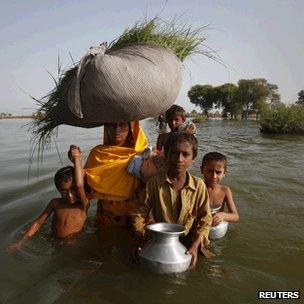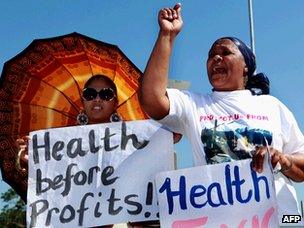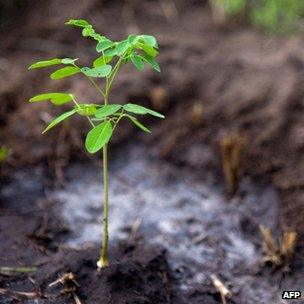Durban: A summit of small steps?
- Published
- comments

Some developing countries argue that disasters are increasing, so funds are needed now
You may have missed it in the non-deluge of publicity and the absence of fanfare; but this year's UN climate summit, external will be getting underway in exactly four weeks' time.
The location this year is Durban in South Africa; and appropriately for the Rainbow Nation, delegates from different parts of the planet are approaching the meeting with a plethora of different priorities.
The task, as always, will be to find enough common ground for an outcome that takes the global community of nations forwards, if only by a few steps, rather than backwards.
Such steps as there may be are likely to be small ones.
A massive, epoch-making deal of the type that was hypothesised for Copenhagen, external two years ago is definitely not on the cards.
Instead, the approach - which bore some fruit in Cancun, Mexico last year - is to concentrate on specific areas and press forward on those.
These days, pretty much everywhere that hosts significant UN environment talks gets something named after it - the Nairobi Work Programme, external from 2006, the Bali Roadmap, external from 2007, the Copenhagen Accord, external from 2009, and the Cancun Agreements, external from 2010.
(Poznan in Poland, which hosted in 2008, ended up with its name on nothing - which broadly matched the amount of progress achieved, with everyone craning their necks for a look at Copenhagen just down the road.)
And the immediate focus for Durban is finalising at least some of the Cancun Agreements.

Durban has already seen anti-fossil fuel protests this year, after an oil refinery blaze
Speeding up co-operation on clean technology, external in order to help poor countries get their hands on it quickly is the one that appears to be furthest down the track.
The way such operations would be governed inside the UN process is pretty much decided, and nuts and bolts discussions have been underway for nearly a year.
The Cancun target was to get the show up and running by 2012 - and it looks do-able.
The other elements of the Cancun Agreements encompass forest protection, adaptation to climate impacts, and finance - the promised transfer of funds from rich countries to poor in order to help them protect forests, adapt to climate impacts, and "green" their economies.
In Copenhagen, rich governments committed to providing $30bn over 2010-12 in fast-start finance, external. In Durban, they'll be saying broadly that they're on track - that a good proportion of the money has been committed, and much of it has been disbursed.
But a closer reading of the last report, external they sent into the UN climate convention (UNFCCC) in August reveals some of the underlying issues that continue to raise the ire of some developing nations.
Firstly, a lot of the money has been channelled through international institutions (I can't give an exact proportion, as not all funders have reported).
Nothing wrong with that in principle. But in practice, it means a longer period before the funds are actually in the hands of the poor countries that want to use them; and in addition, some of the biggest funds are run by the World Bank, about which developing countries continue to have reservations.
There's also the fact that much of the money - more than half, in the case of the EU - is being given in the form of loans, subsidies and equities, rather than as straight financial contributions, as you might have inferred from the language in use at Copenhagen.
The longer-term pledge of rich countries is to provide $100bn per year by 2020.
But they're not going to do it from the public purse, despite the demands of developing countries that see it as essential compensation for decades of damage from coal-burning in industrialised nations.
So they need to come up with something else.
Since Copenhagen, that "something else" has gone under the shape-shifting appellation of "innovative mechanisms".
But somewhat predictably, various mechanisms that have been proposed, such as the "Robin Hood" tax on financial transactions, use of the IMF's reserves and a tax on international aviation, have largely been shot down by the objections of finance ministries.

Money for the proposed Green Climate Fund are growing very slowly so far
The question is a pressing one, because as things stand there's a funding gap between 2012 and 2020; and even if it's kept at $10bn per year until 2020, obviously there's no way you can enact a 10-fold leap overnight.
Practically, too, climate impacts are likely to ramp up progressively between 2012 and 2020, so the funding should ramp up too.
The preparatory meetings for Durban have asked the questions of what might be politically acceptable as a source, and how its application could be made equitable.
A front-runner - advocated, for example, in a recent paper from Oxfam and WWF, external - is a tax on shipping fuels, levied globally, but with a mechanism to re-imburse poor countries from adverse impacts.
However, even Oxfam/WWF reckon it could raise just $10bn per year; so there is a lot of work to be done, and done quickly, if the idea of "innovative mechanisms" is to prove more than the mirage that many feared it would be when initially proposed.
In the presumption that ways of raising the cash will be found, governments did agree in Cancun on a mechanism for managing it: the Green Climate Fund. The challenge for Durban is to "operationalise" it.
It was in the run-up to Poznan in 2008 that I first heard the phrase "we might get a deal on Redd this year".
Redd - Reducing Emissions from Deforestation and forest Degradation, external - is, in principle, the easiest item on the UNFCCC's menu, because just about everyone thinks a scheme to pay poor countries for protecting their forests is a good idea.
Three years later, there has been some progress. As of six months ago, $5.5bn had been committed from developed nations.
But that doesn't mean it's fully functioning. And although no-one doubts the good intentions of the UN hierarchy in bolting onto Redd other concepts such as preservation of rural livelihoods and biodiversity, external, it has now become a much more complex beast, operating half-in and half-out of the UN climate process.
Some developing countries have taken a position that they will not fully commit to Redd unless it is part of a comprehensive climate deal - and that is as far away as ever.
In fact, reading this brief (lack of) progress report, you may have wondered where the concept of "a comprehensive climate deal" had gone. Isn't it what journalists usually focus on leading up to, or coming away from, one of these big summits?
To be honest, on this occasion, there's no point.
As has been the case since Copenhagen, there is no sign that important governments such as the US, China, Russia and Japan really want such a thing.
Or at least, when they do say they want such a thing and you analyse the strings attached, the statements have a habit of falling into the category defined in the immortal Tom Waits lyric "the large print giveth, and the small print taketh away".

The Durban summit will take place against the background of financial and job worries
The biggest of all the crunch points surrounds the Kyoto Protocol.
I could have written this sentence before the Cancun summit - perhaps I did write it then - because nothing has changed; but in a nutshell, developing countries want the protocol to continue because it is the one part of the entire process that binds industrialised countries to emission cuts, and because it contains mechanisms that automatically levy funds and transfer them to the less well-heeled.
These factors are also why most developed nations don't want it extended.
The EU is prepared to continue if others come on board; but for Japan, Canada and Russia it's off the agenda, while for the US it's as far away as Never Never Land.
Durban has been touted as the "last-chance" summit for agreeing whether to continue with emission reduction pledges under the protocol, as they currently expire at the end of 2012.
Assuming that the huge gulf is not bridged in Durban, the protocol could be declared dead when we leave - but more likely, I think, is that proponents vow to mount a last-ditch rescue attempt leading up to next year's summit, which will fall just weeks before the current commitment period expires.
Underpinning everything is still a huge lack of trust between the various blocs - particularly, between rich and poor.
As UNFCCC executive secretary Christiana Figueres summed it up, external in a recent speech: "The deep North-South divide over historical responsibility still has more weight than the forward looking approach of respective capabilities".
In preparatory meetings, for the first time in years, this has led to perhaps the thorniest of all issues raising its head; whether the simple, stark division of countries into two blocs - rich and poor - is any longer appropriate.
In one sense, of course it's not appropriate. How can you have the oil-rich Gulf states, with per-capita incomes higher than $30,000 per year and an interest in fighting off attempts at curbing fossil fuel use, inside the same bloc as small island developing states where incomes are one-tenth of that and the future at stake from rising sea-levels?
The Russian Federation has put forward a proposal, external that would oblige the UNFCCC to undertake a periodic review of which countries have become weathy enough that they should hop over to the rich side of the fence.
Provocative and explosive, if Russia pushes it; because you can guarantee that others will push back very strongly. The Chinas and the Brazils of this world may be industrialising and developing fast; but, they argue, it's still the obligation of the traditionally rich to act first and fastest, as they industrialised first.
In the face of deadlock between rich and poor, Papua New Guinea has tabled a proposal, external that is even more intriguing; to allow voting where there is no consensus.
Its flamboyant lead negotiator Kevin Conrad, who famously asked the US to "get out of the way" when it was the only country blocking agreement on the final morning in Bali, toyed with the idea of tabling this in Copenhagen, but eventually pulled back.
As a lawyer, he argues that the UNFCCC's decision-making process has never been fully clarified, and voting ought to be allowed.
With the developing world bloc numerically so superior, the sky would theoretically be their limit. Extension of the Kyoto Protocol, an obligation on developed nations to negotiate their emission cutting pledges, $100bn to come from public funds... who knows what could be passed, if all you need is three-quarters of the chamber?
Except that it would be a futile gesture. The entire process is bankrolled, after all, by the rich West; which is why their approval is ultimately needed for any movement.
It will be intriguing to see how far PNG takes this idea, and how much support it gets.
Follow Richard on Twitter, external